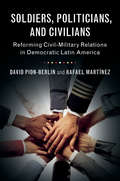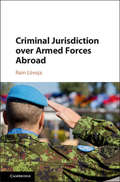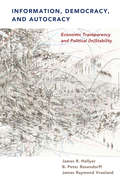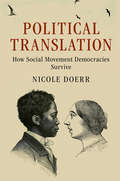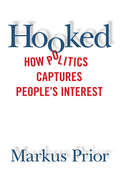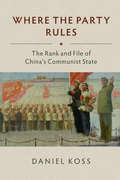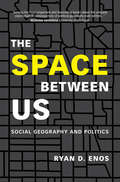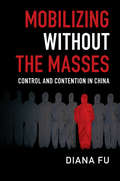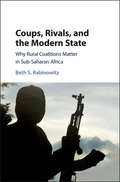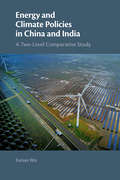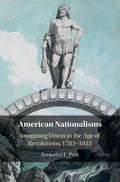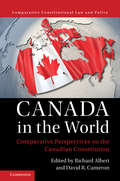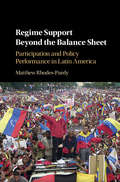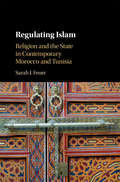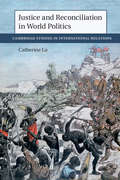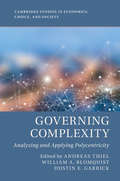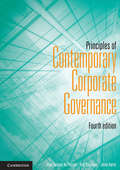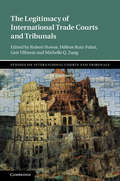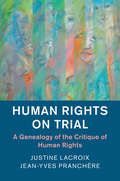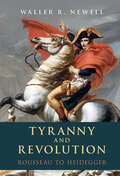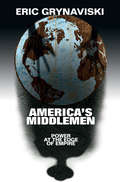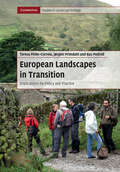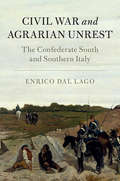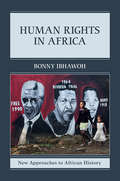- Table View
- List View
Soldiers, Politicians, and Civilians: Reforming Civil-Military Relations in Democratic Latin America
by David Pion-Berlin Rafael MartínezAre interactions between soldiers, politicians, and civilians improving? Every nation has to come to grips with achieving a more enduring harmony between government, the armed forces, and society if it aspires to strengthen its democracy. While there is an abundance of studies on civil-military affairs, few examine all three of these actors, let alone establish any standards with which to assess whether progress is being made. This ambitious book devises a novel framework equipped with six dimensions, each of which opens a unique window into civil-military affairs, and which form a more integrated view of the subject. Those dimensions are accompanied by a set of benchmarks and metrics that assess progress and compare one country against another. The framework is applied to case studies of Argentina, Brazil, Chile, and Uruguay, with the conviction that insights could be gleaned that may be relevant elsewhere. Ultimately, by unpacking the civil-military relation into its various dimensions, this study has shed light on what it takes to transform what was once a politically-minded military into an organization dedicated to serving a democratic state and society.
Criminal Jurisdiction over Armed Forces Abroad
by Eyal Benvenisti Rain LiivojaRain Liivoja explores why, and to what extent, armed forces personnel who commit offences abroad are prosecuted under their own country's laws. After clarifying several conceptual uncertainties in the doctrine of jurisdiction and immunities, he applies the doctrine to the extraterritorial deployment of service personnel. Comparing the law and practice of different states, the author shows the sheer breadth of criminal jurisdiction that countries claim over their service personnel. He argues that such claims disclose a discrete category of jurisdiction, with its own scope and rationale, which can be justified as a matter of international law. By distinguishing service jurisdiction as a distinct category, the analysis explains some of the peculiarities of military criminal law and also provides a basis for extending national criminal law to private military contractors serving the state. This book is essential for scholars and practitioners in international and criminal law, especially in military contexts.
Information, Democracy and Autocracy: Economic Transparency and Political (In)Stability
by James Raymond Vreeland James R. Hollyer B. Peter RosendorffAdvocates for economic development often call for greater transparency. But what does transparency really mean? What are its consequences? This breakthrough book demonstrates how information impacts major political phenomena, including mass protest, the survival of dictatorships, democratic stability, as well as economic performance. The book introduces a new measure of a specific facet of transparency: the dissemination of economic data. Analysis shows that democracies make economic data more available than do similarly developed autocracies. Transparency attracts investment and makes democracies more resilient to breakdown. But transparency has a dubious consequence under autocracy: political instability. Mass-unrest becomes more likely, and transparency can facilitate democratic transition - but most often a new despotic regime displaces the old. Autocratic leaders may also turn these threats to their advantage, using the risk of mass-unrest that transparency portends to unify the ruling elite. Policy-makers must recognize the trade-offs transparency entails.
Political Translation: How Social Movement Democracies Survive (Cambridge Studies in Contentious Politics)
by Nicole DoerrAt a time when the legitimacy of democracies is in question, calls to improve the quality of public debate and deliberative democracy are sweeping the social sciences. Yet, real deliberation lies far from the deliberative ideal. Theorists have argued that linguistic and cultural differences foster inequality and impede democratic deliberation. In this empirical study, the author presents the collective practices of political translation, which help multilingual and culturally diverse groups work together more democratically than homogeneous groups. Political translation, distinct from linguistic translation, is a set of disruptive and communicative practices developed by activists and grassroots community organizers in order to address inequities hindering democratic deliberation and to entreat powerful groups to work together more inclusively with disempowered groups. Based on ten years of fieldwork, Political Translation provides the first systematic comparative study of deliberation under conditions of linguistic difference and cultural misunderstandings.
Hooked: How Politics Captures People's Interest
by Markus PriorPolitical interest is the strongest predictor of 'good citizenship', yet hardly anything is known about it. For the first time in over three decades, here is a study explaining what political interest is, where it comes from, and why it matters. Providing the most thorough description available of political interest in four Western democracies this study analyzes large household panel data sets rarely used in political science to explain how interest develops in people's lives. In an accessible manner, the book's analytical approach pushes applied social scientists to consider how panel data can be used to better understand political behavior. It does so in a way that doesn't gloss over complexities, and explains them in straightforward language. Advanced statistical methods are presented informally, accompanied by graphical illustrations that require no prior knowledge to understand the methods used.
Where the Party Rules: The Rank and File of China's Authoritarian State
by Daniel KossIn most non-democratic countries, today governing forty-four percent of the world population, the power of the regime rests upon a ruling party. Contrasting with conventional notions that authoritarian regime parties serve to contain elite conflict and manipulate electoral-legislative processes, this manuscript presents the case of China and shows that rank and file members of the Communist Party allow the state to penetrate local communities. Subnational comparative analysis demonstrates that in 'red areas' with high party saturation, the state is most effectively enforcing policy and collecting taxes. Since party membership patterns are extremely enduring, they must be explained by events prior to the Communist takeover in 1949. Frontlines during the anti-colonial Sino-Japanese War (1937–45) continue to shape China's political map even today. Newly available evidence from the Cultural Revolution (1966–76) and the Great Leap Forward (1958–61) shows how a strong local party basis sustained the regime in times of existential crisis.
The Space Between Us: Social Geography and Politics
by Ryan D. EnosThe Space between Us brings the connection between geography, psychology, and politics to life. By going into the neighborhoods of real cities, Enos shows how our perceptions of racial, ethnic, and religious groups are intuitively shaped by where these groups live and interact daily. Through the lens of numerous examples across the globe and drawing on a compelling combination of research techniques including field and laboratory experiments, big data analysis, and small-scale interactions, this timely book provides a new understanding of how geography shapes politics and how members of groups think about each other. Enos' analysis is punctuated with personal accounts from the field. His rigorous research unfolds in accessible writing that will appeal to specialists and non-specialists alike, illuminating the profound effects of social geography on how we relate to, think about, and politically interact across groups in the fabric of our daily lives.
Cambridge Studies in Contentious Politics: Control and Contention in China (Cambridge Studies in Contentious Politics)
by Fu DianaWhen advocacy organizations are forbidden from rallying people to take to the streets, what do they do? When activists are detained for coordinating protests, are their hands ultimately tied? Based on political ethnography inside both legal and blacklisted labor organizations in China, this book reveals how state repression is deployed on the ground and to what effect on mobilization. It presents a novel dynamic of civil society contention - mobilizing without the masses - that lowers the risk of activism under duress. Instead of facilitating collective action, activists coach the aggrieved to challenge authorities one by one. In doing so, they lower the risks of organizing while empowering the weak. This dynamic represents a third pathway of contention that challenges conventional understandings of mobilization in an illiberal state. It takes readers inside the world of underground labor organizing and opens the black box of repression inside the world's most powerful authoritarian state.
Coups, Rivals, and the Modern State: Why Rural Coalitions Matter in Sub-Saharan Africa
by Beth S. RabinowitzState development in Africa is risky, even life-threatening. Heads of state must weigh the advantage of promoting political and economic development against the risk of fortifying dangerous political rivals. This book takes a novel approach to the study of neopatrimonial rule by placing security concerns at the center of state-building. Using quantitative evidence from 44 African countries and in-depth case studies of Ghana and Cote d'Ivoire, Rabinowitz demonstrates that the insecurities of the African state make strategically aligning with rural leaders critical to political success. Leaders who cultivate the goodwill of the countryside are better able to endure sporadic urban unrest, subdue political challengers, minimize ethnic and regional discord, and prevent a military uprising. Such regimes are more likely to build infrastructure needed for economic and political development. In so doing, Rabinowitz upends the long-held assumption that African leaders must cater to urban constituents to secure their rule. An extensive resource offering a quantitative and qualitative analysis of state development across forty-four African states. Proposes new typology of neo-patrimonial strategies. Presents engaging historical narratives of specific leaders and their attempts to hold power
Energy and Climate Policies in China and India: A Two-Level Comparative Study
by Fuzuo WuThe book explores the proactive and reactive features of China and India's domestic and foreign policies to address two intertwined challenges: first, China and India have taken policy measures that accord with their own domestic priorities; second, both countries have had to alter the trajectory of their proactive policy measures as a result of external pressures. The book argues that China and India's proactive and reactive policy measures to address energy insecurity and climate change have been shaped by their two-level pressures. At the domestic/unit level, both countries have had to sustain fast economic growth and eradicate poverty in order to maximize their economic wealth. At the international/systemic level, both countries have sought to enhance their great power status in the international system which is characterized by not only asymmetrical interdependence but also global governance in general, and global energy and climate governance in particular.
American Nationalisms
by Benjamin E. ParkAmerica was born in an age of political revolution throughout the Atlantic world, a period when the very definition of 'nation' was transforming. Benjamin E. Park traces how Americans imagined novel forms of nationality during the country's first five decades within the context of European discussions taking place at the same time. Focusing on three case studies - Massachusetts, Pennsylvania, and South Carolina - Park examines the developing practices of nationalism in three specific contexts. He argues for a more elastic connection between nationalism and the nation-state by demonstrating that ideas concerning political and cultural allegiance to a federal body developed in different ways and at different rates throughout the nation. American Nationalisms explores how ideas of nationality permeated political disputes, religious revivals, patriotic festivals, slavery debates, and even literature.
Comparative Constitutional Law and Policy: Comparative Perspectives on the Canadian Constitution (Comparative Constitutional Law and Policy)
by Cameron David R. Richard AlbertIn this volume marking the Sesquicentennial of Confederation in Canada, leading scholars and jurists discuss the evolution of the Canadian Constitution since the British North America Act 1867; the role of the Supreme Court in interpreting the Constitution as a 'living tree' capable of application to new legal issues; and the growing influence of both the Constitution, with its entrenched Charter of Rights and Freedoms, and the decisions of the Court on other constitutional courts dealing with a wide range of issues pertaining to human rights and democratic government. The contributors assess how the Canadian Constitution accommodates the cultural diversity of the country's territories and peoples while ensuring the universal applicability of its provisions; the role of the Court in interpreting and applying the Constitution; and the growing global influence of the Constitution and decisions of the Court on legislatures and courts in other countries.
Regime Support Beyond the Balance Sheet: Participation and Policy Performance in Latin America
by Matthew Rhodes-Purdy"This book challenges the conventional wisdom that policy performance is the most important determinant of regime support. It does so by focusing on two countries where performance and support do not match. Chile is the economic envy of every country in Latin America, yet support has been surprisingly anemic. By contrast, Venezuela managed to maintain extremely high levels of support during the reign of Hugo Chavez despite severe failures of governance. Resolution of these paradoxes requires turning away from policy decisions and focusing instead on how those decisions are made. Taking inspiration from democratic theory and social psychology, this book argues that extensive opportunities for direct participation in the political process engenders in citizens strong feelings of efficacy - a sense of control over the course of politics. Rhodes-Purdy uses a mixed-methods approach to test this theory, including qualitative case studies, analysis of survey data, and experimental methods"--
Regulating Islam: Religion and the State in Contemporary Morocco and Tunisia
by Sarah J. FeuerMany countries in the Arab world have incorporated Islam into their state- and nation-building projects, naming it the 'religion of the state'. Regulating Islam offers an empirically rich account of how and why two contemporary Arab states, Morocco and Tunisia, have sought to regulate religious institutions and discourse. Drawing on a range of previously unexamined sources, Sarah J. Feuer traces and analyzes the efforts of Moroccan and Tunisian policymakers to regulate Islamic education as part of the respective regimes' broader survival strategies since their independence from French rule in 1956. Out of the comparative case study emerges a compelling theory to account for the complexities of religion-state dynamics across the Arab world today, highlighting the combined effect of ideological, political, and institutional factors on religious regulation in North Africa and the Middle East. The book makes an important and timely contribution to the on-going scholarly and policy debates concerning religion, politics, and authoritarian governance in the post-uprisings Arab landscape.
Justice and Reconciliation in World Politics (Cambridge Studies in International Relations)
by Catherine Lualls for justice and reconciliation in response to political catastrophes are widespread in contemporary world politics. What implications do these normative strivings have in relation to colonial injustice? Examining cases of colonial war, genocide, forced sexual labor, forcible incorporation, and dispossession, Lu demonstrates that international practices of justice and reconciliation have historically suffered from, and continue to reflect, colonial, statist, and other structural biases. The continued reproduction of structural injustice and alienation in modern domestic, international, and transnational orders generates contemporary duties of redress. How should we think about the responsibility of contemporary agents to address colonial structural injustices, and what implications follow for the transformation of international and transnational orders? Redressing the structural injustices implicated in or produced by colonial politics requires strategies of decolonization, decentering, and disalienation that go beyond interactional practices of justice and reconciliation, beyond victims and perpetrators, and beyond a statist world order.
Governing Complexity: Analyzing and Applying Polycentricity (Cambridge Studies in Economics, Choice, and Society)
by Andreas Thiel William A. Blomquist Dustin E. GarrickThere has been a rapid expansion of academic interest and publications on polycentricity. In the contemporary world, nearly all governance situations are polycentric, but people are not necessarily used to thinking this way. Governing Complexity provides an updated explanation of the concept of polycentric governance. The editors provide examples of it in contemporary settings involving complex natural resource systems, as well as a critical evaluation of the utility of the concept. With contributions from leading scholars in the field, this book makes the case that polycentric governance arrangements exist and it is possible for polycentric arrangements to perform well, persist for long periods, and adapt. Whether they actually function well, persist, or adapt depends on multiple factors that are reviewed and discussed, both theoretically and with examples from actual cases.
Rome and the Making of a World State, 150 BCE – 20 CE
by Josiah OsgoodIn the century following 150 BCE, the Romans developed a coherent vision of empire and a more systematic provincial administration. The city of Rome itself became a cultural and intellectual center that eclipsed other Mediterranean cities, while ideas and practices of citizenship underwent radical change. <P><P>In this book, Josiah Osgood offers a new survey of this most vivid period of Roman history, the Late Republic. While many discussions focus on politics in the city of Rome itself, his account examines developments throughout the Mediterranean and ties political events more firmly to the growth of overseas empire. The volume includes a broad overview of economic and cultural developments. By extending the story well beyond the conventional stopping date of Julius Caesar's assassination in 44 BCE, Osgood ultimately moves away from the old paradigm of the fall of the Republic. The Romans of the Late Republic emerge less as the disreputable gangsters of popular imagination and more as inspired innovators.<P> Offers a new, more positive view of the Late Roman Republic, challenging the entrenched idea that the Late Republic was a period of inexorable decline,<P> Gives a clear narrative of political history while also introducing major economic and cultural developments, allowing students to learn of up-to-date research in the field and the different approaches historians take,<P> Provides many maps and illustrations, demonstrating how material evidence is important for our understanding of Roman history.
Principles of Contemporary Corporate Governance (4th Edition)
by Jean Jacques du Plessis Anil Hargovan Jason HarrisNow in its fourth edition, Principles of Contemporary Corporate Governance offers comprehensive coverage of the key topics and emerging themes in private sector corporate governance. It explains both the principles of corporate governance systems and their real-world application in an authoritative and engaging manner. This fully revised and updated text has four parts: basic concepts, board structures and company officers; corporate governance in Australia; corporate governance in international and global contexts; and shareholder activism and business ethics. The coverage of international contexts, written by specialists, includes sections on the US, the UK, Canada, South Africa, the EU, the OECD, Germany, Japan, China and Indonesia, plus new sections on New Zealand and India. A new chapter on business ethics and corporate governance presents contemporary discussions on the topic and explores some of the broader legal issues. Principles of Contemporary Corporate Governance is an indispensable resource for business and law students studying corporate governance, and also for academic researchers and practitioners wanting a deeper understanding of its underlying principles.
The Legitimacy of International Trade Courts and Tribunals (Studies on International Courts and Tribunals )
by Geir Ulfstein Robert Howse Ruiz-Fabri Hélène Michelle Q. ZangThe recent rise of international trade courts and tribunals deserves systemic study and in-depth analysis. This volume gathers contributions from experts specialized in different regional adjudicators of trade disputes and scrutinizes their operations in the light of the often-debated legitimacy issues. It not only looks into prominent adjudicators that have played a significant role for global and regional integration, but it also includes the newly established and/or less-known judicial actors. Critical topics covered range from procedures and legal techniques during the adjudication process to the pre- and postadjudication matters in relation to forum selection and decision implementation. The volume features cross-cutting interdisciplinary discussions among academics and practitioners, lawyers, philosophers, and political scientists. In addition to fulfilling the research vacuum, it aims to address the challenges and opportunities faced in international trade adjudication.
Human Rights on Trial: A Genealogy Of The Critique Of Human Rights (Human Rights In History Ser.)
by Justine Lacroix Jean-Yves PranchèreThe first systematic analysis of the arguments made against human rights from the French Revolution to the present day. Through the writings of Edmund Burke, Jeremy Bentham, Auguste Comte, Louis de Bonald, Joseph de Maistre, Karl Marx, Carl Schmitt and Hannah Arendt, the authors explore the divergences and convergences between these 'classical' arguments against human rights and the contemporary critiques made both in Anglo-American and French political philosophy. Human Rights on Trial is unique in its marriage of history of ideas with normative theory, and its integration of British/North American and continental debates on human rights. It offers a powerful rebuttal of the dominant belief in a sharp division between human rights today and the rights of man proclaimed at the end of the eighteenth century. It also offers a strong framework for a democratic defence of human rights.
Tyranny and Revolution: Rousseau to Heidegger
by Waller R. NewellThe Philosophy of Freedom from Rousseau to Heidegger launched a great protest against modern liberal individualism, inspired by the virtuous political community of the ancient Greeks. Hegel argued that the progress of history was gradually bringing about greater freedom and restoring our lost sense of community. But his successors Marx, Nietzsche and Heidegger rejected Hegel's version of the end of history with its legitimization of the bourgeois nation-state. They sought to replace it with ever more utopian, apocalyptic and illiberal visions of the future: Marx's Socialism, Nietzsche's Overman, and Heidegger's commitment to Nazism. This book combines an exceptionally clear and rich study of these thinkers with a deep dive into the extent to which their views fed the political catastrophes of revolution, tyranny and genocide, including the Jacobins, Bolsheviks, Nazis, Khmer Rouge, ISIS and populist nationalism, but argues that the Philosophy of Freedom remains indispensable for understanding today's world.
America’s Middlemen: Power At The Edge Of Empire
by Eric GrynaviskiThroughout American political history, the US government has formed alliances with militias, tribes, and rebels. Sometimes, these alliances have been successful, dramatically reshaping the battlefield. But these alliances have also risked creating larger wars in regions where the United States had no real interest. <P><P>Understanding these alliances - and much of American political history - requires moving beyond our normal focus on traditional diplomats or social elites. Traders, missionaries, former slaves, and low-level government employees drove these alliances. These intermediaries used their relationships across borders to shape security politics, affecting American and thereby world history. <P>Skillfully integrating political science with history and sociology, Eric Grynaviski provides a novel account of who matters and why in international politics. By developing broader views about political agency - how people come to make a difference in world politics - he brings into focus new histories of world politics and how they matter for scholars and the public.<P> Proposes a new theory of agency in international politics that will resonate in interdisciplinary conversations about agency and politics.<P> Provides fresh and new histories of important events in international politics.<P> Features extensive and innovative use of archival evidence.<P>
European Landscapes in Transition: Implications for Policy and Practice (Cambridge Studies in Landscape Ecology)
by Jørgen Primdahl Bas Pedroli Teresa Pinto-CorreiaEuropean rural landscapes as we experience them today are the result of ongoing processes and interactions between nature and society. These are changing fast: the future landscapes will be different from those we know currently. Written for academics, policy-makers and practitioners, this book is the first to explore the complex histories of rural landscapes in Europe as a basis for their sound governance in future. Tensions between the needs of agricultural spaces driven by economic incentives and a variety of non-agricultural functions are explored to demonstrate current challenges and the shortfalls in the policies that address them. Using inspiring case studies that highlight the roles of regional agents and communities, the authors go further than the usual analyses to illustrate the importance of local context. Written by experts currently working to revitalise the rural landscapes of Europe, the text concludes with suggestions for improving landscape policy and planning practice.
Civil War and Agrarian Unrest: The Confederate South and Southern Italy (Cambridge Studies on the American South)
by Dal Lago EnricoBetween 1861 and 1865, both the Confederate South and Southern Italy underwent dramatic processes of nation-building, with the creation of the Confederate States of America and the Kingdom of Italy, in the midst of civil wars. This is the first book that compares these parallel developments by focusing on the Unionist and pro-Bourbon political forces that opposed the two new nations in inner civil conflicts. Overlapping these conflicts were the social revolutions triggered by the rebellions of American slaves and Southern Italian peasants against the slaveholding and landowning elites. Utilizing a comparative perspective, Enrico Dal Lago sheds light on the reasons why these combined factors of internal opposition proved fatal for the Confederacy in the American Civil War, while the Italian Kingdom survived its own civil war. At the heart of this comparison is a desire to understand how and why nineteenth-century nations rose and either endured or disappeared. The first systematic comparison of aspects of the American Civil War with a contemporaneous civil war in another country: Italy. Utilizes the comparison between the Confederate States of America and the Kingdom of Italy to shed light on the reasons for the rise (and survival or fall) of nineteenth-century nations. Provides a valuable contribution comparative history and the study of nineteenth-century nationalism and nation-building.
Human Rights in Africa (New Approaches to African History #12)
by Bonny IbhawohHuman rights have a deep and tumultuous history that culminates in the age of rights we live in today, but where does Africa's story fit in with this global history? Here, Bonny Ibhawoh maps this story and offers a comprehensive and interpretative history of human rights in Africa. Rather than a tidy narrative of ruthless violators and benevolent protectors, this book reveals a complex account of indigenous African rights traditions embodied in the wisdom of elders and sages; of humanitarians and abolitionists who marshalled arguments about natural rights and human dignity in the cause of anti-slavery; of the conflictual encounters between natives and colonists in the age of Empire and the 'civilizing mission'; of nationalists and anti-colonialists who deployed an emergent lexicon of universal human rights to legitimize longstanding struggles for self-determination, and of dictators and dissidents locked in struggles over power in the era of independence and constitutional rights.
